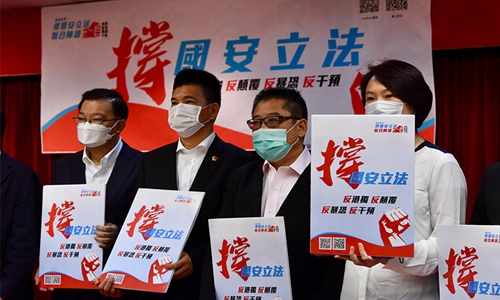National security law preserves HK judiciary
Chief executive to appoint judges ‘based on Basic Law’

The United Front Supporting National Security Legislation holds a press conference on June 8, saying that 2.92 million Hong Kong citizens have signed a petition in support of the proposed national security legislation. Photo: cnsphoto
After the draft law to safeguard national security in the Hong Kong Special Administrative Region (HKSAR) was reviewed by China's top legislature and some details were released on Saturday , Western countries, media, Hong Kong opposition politicians and some legal professionals said they fear the law would harm the city's judicial independence. But senior Hong Kong legal experts said the draft law is in accordance with the Basic Law.
The draft law, which was reviewed at the meeting of the 19th Session of the 13th National People's Congress (NPC) Standing Committee which ended on Saturday, states that the commissioner's office for national security affairs in Hong Kong and relevant national authorities would exercise jurisdiction over a very small number of crimes concerning national security under special circumstances.
The chief executive of the HKSAR government shall appoint judges to handle crimes that endanger national security, the draft law says.
The West and Hong Kong oppositionists are using these details to accuse China's central government of "undermining the judicial independence of the city and the "one country, two systems" principle.
Ronny Tong Ka-wah, a senior barrister in the HKSAR and former chairman of the Hong Kong Bar Association, told the Global Times that the newly unveiled draft of the national security law for Hong Kong makes him "reassured," and that it was "strange" that the Hong Kong Bar Association said judges appointed by the chief executive to deal with crimes against national security were "ruled by man" because the appointments are based on the Basic Law.
Tong said he would have concerns if the national security law could damage Hong Kong's judicial independence. But after seeing the main content of the draft law, he felt at ease "especially the relevant provisions for the international covenant on civil and political rights, and international covenant on economic, social and cultural rights mentioned in the draft."
Elsie Leung Oi-sie, the deputy director of the Hong Kong Basic Law Committee of the NPC Standing Committee and a former Secretary of Justice, told the Global Times that in Western countries, the central governments also get involved once a case involves separatism and national sovereignty. "Spain's jurisdiction over its autonomous region of Catalonia is a good example. The secessionist leaders from Catalonia were tried in the country's Supreme Court in Madrid."
When it comes to cases involving "Tibet separatism" and "Xinjiang separatism," central authorities need to step in and handle these situations. Hong Kong law enforcement agencies have no experience in dealing with these types of cases, the former official said.
"Of course the meaning of 'specific circumstances' and 'very few cases' depends on the detailed provisions in the law," she said.
Tong dismissed an accusation by Anita Yip Hau-ki, the vice chairman of the Bar Association, who said these appointments would mean "the rule of man." Tong said Yip's claim is "strange," as the Basic Law states that judges in the HKSAR are appointed by the chief executive on the recommendation of an independent commission composed of local judges and eminent persons from the legal profession and other sectors.
"Hong Kong's general law and some administrative regulations also give the chief executive the authority to appoint judges for special cases, such as major public investigations," said Tong, noting that "whoever is appointed by the chief executive will hear cases independently. It's not the chief executive hearing the cases, so I don't see anything that undermines the independence of the judiciary in Hong Kong."
"I don't want to be too critical of them [some people of the Bar Association] because I was once the chairman of the association. I just hope professional organizations could speak out professionally," Tong said.
Senior legal figures should understand Hong Kong's legal system, Tong said, while noting that "given that they understand it, I wonder why they still made such comments. That made me feel very strange."
Newspaper headline: New law preserves HK judiciary
- HK leader highlights confidence in future economy
- Upcoming national security law won't affect HK's judiciary independence: former Secretary for Justice
- National security law for HK ‘likely to be enacted by July 1’
- Chief executive appointing judges for national security cases based on Basic Law: HK senior counsel